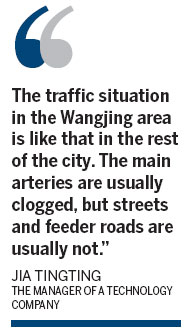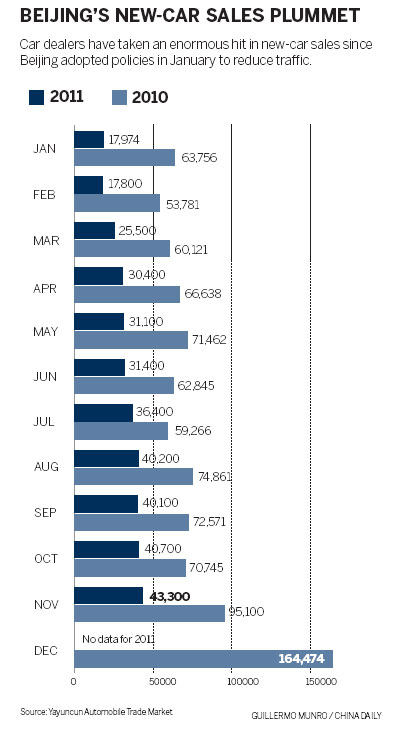Beijing to test GPS guidance on the road
Updated: 2011-12-24 10:07
By Xu Wei (China Daily)
|
|||||||||
BEIJING - As the city marks the one-year anniversary of measures to solve its traffic woes, authorities are eager to begin an experiment with a GPS system that could alert drivers to real-time road congestion.
The new GPS system can show the quickest way to a destination.
 |
"The traffic situation in the Wangjing area is like that in the rest of the city. The main arteries are usually clogged, but streets and feeder roads are usually not," said Jia Tingting, the manager of a technology company who is in charge of the experimental program.
"The situation can certainly improve if we can direct the traffic to less congested roads," Jia said.
If the experiment proves successful, it will be expanded to other areas through government support and commercial involvement.
This is only one of the municipal authority's efforts to push for an intelligent transportation system and to encourage the use of public transportation. Other ideas include cell phone applications that would inform commuters of the arrival time of the next bus or subway train before they leave home, and an online information system about parking lot vacancies.
Beijing will devote 5.6 billion yuan ($884 million) in the next five years to further develop an intelligent transportation system to solve its traffic problems, said Wang Gang, an official at the Beijing municipal commission of transport.
In a conference on relieving traffic congestion on Dec 6, the municipal government named the establishment of a "transportation microcirculation system" - a term used to define the road transport at hutong and street level rather than main arteries - as well as rail transit as the top priorities in next year's plan to solve the traffic problem.
"Traffic congestion has parallels to the circulatory system in our bodies. If the blood capillaries can run smoothly, there will certainly be little chance of congestion in the main artery," said Duan Liren, a professor on transportation at Chang'an University and member of an expert advisory committee to the municipal government.
Even in the Tiantongyuan community, an area renowned for its heavy traffic, the roads inside the communities are usually less crowded, Duan said.
"But random parking on both sides of the roads is causing the congestion," Duan said.
The municipal government plans to build more parking lots next year and further tighten parking restrictions on streets to clear them for traffic.
The plans also include building more secondary main roads and feeder roads.
However, Wang Xiaojing, an ITS (intelligent transportation system) expert at the Ministry of Transport, says the city should be more devoted to public transportation.
One problem, Wang said, is the uncertainly of road conditions at some hutong.
"Even if they have the GPS system, drivers may fear that they could not get out once they enter the hutong," Wang said.
Nevertheless, he supports establishing the "transportation microcirculation system" to alleviate congestion.
"It's the only way to find more road space, because it is virtually impossible to build more roads in downtown areas," Wang said.
 |











